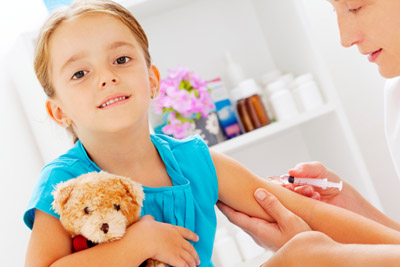Immunizations are a safe and effective way to prevent dangerous diseases. Every child should be protected against diseases that can cause brain damage, paralysis, deafness, blindness, cancer and even death.
Clinic: Second Thursday of Every Month
Immunization clinics are held the second Thursday of every month and at other times as needed.
Those Who Qualify
- Those with Title XIX/Medicaid
- Those who have no health insurance
- Those with private health insurance that does not include an immunization benefit
All infants should complete their basic series of immunizations before the age of 2 years. However, if your child has received no immunizations or only part of them, it is not too late to start or finish for complete protection.
Newly Recommended Vaccines
Meningococcal Conjugate (Menactra)
The meningococcal conjugate (Menactra) is recommended for children from 11 to 12 years of age. This will help protect against the most common forms of bacteria that cause meningococcal disease (strains A, C, Y and the W-135). A second dose is recommended at age 16-18 to ensure coverage through the child’s college years.
Serogroup B Meningococcal (MenB)
MenB may be given to anyone 16 through 23 years old to provide short-term protection against most strains of serogroup B meningococcal disease. Sixteen through eighteen years of age are the preferred ages for vaccination. For best protection, more than 1 dose of a serogroup B meningococcal vaccine is needed.
Hepatitis A
Hepatitis A vaccine is now recommended at age 12-23 months with a booster dose needed 6-18 months later. Any older child who has not received the Hepatitis A vaccine should do so.
Tdap
Tdap is now the recommended booster for tetanus, diptheria and pertusis. Children 11-12 years of age should receive a Tdap booster. Any child over 12 years of age should receive a Tdap vaccine no matter when they may have had a Td booster. Any adult who has not had a Tdap vaccine should receive one. Only one Tdap is needed and should be followed in 10 years with a Td booster.
Varicella (Chicken Pox)
The varicella (chicken pox) vaccine is now recommended at age 12-15 months with a booster dose somewhere from age 4-6 years. Older children should make sure they have had two doses of varicella to provide lifelong coverage.
Rotavirus
A new vaccine for rotavirus is now available and given orally to infants at age 2, 4 and 6 months. This vaccine helps prevent a form of gastroenteritis which has a sudden onset of vomiting, fever, and watery diarrhea and is the leading cause of hospitalization in children under 5 years of age.
Human Papillomavirus (HPV)
Another new vaccine is available for both females and males 9 through 26 years of age to protect against human papillomavirus (HPV), a leading cause of cervical cancer as well as vaginal, vulvar, anal, throat and penile cancers. Most adolescents 9 through 14 years of age should get HPV vaccine as a two-dose series with the doses separated by 6-12 months. People who start HPV vaccination at 15 years of age and older should get the vaccine as a three-dose series with the second dose given 1-2 months after the first dose and the third dose given 6 months after the first dose.
Shingles
Shingles is a painful skin rash, often with blisters. Its main symptom is pain, which can be quite severe. Shingles is far more common in people 50 years of age and older than in younger people. An improved vaccine for shingles was approved by FDA in 2017. In clinical trials, it was more than 90% effective in preventing shingles. Two doses, 2 to 6 months apart, are recommended for adults 50 and older. This vaccine is also recommended for people who have already gotten the live shingles vaccine (Zostavax).
Other Vaccines
Adults should be protected with immunizations such as a tetanus booster every 10 years. The Hepatitis A and B vaccines are a preventive series against viral diseases to the liver. Adults age 65 and older and others with chronic health conditions may benefit from an annual influenza vaccination. Your physician may also recommend a pneumonia immunization.
Recommended Immunization Schedule
Public health officials in Iowa recommend the schedule below. Some physicians may vary this schedule to meet your infant’s needs. For more information on the recommended vaccines or new vaccines, please contact Ringgold County Public Health or your health care provider.
| Age: | Immunization: |
|---|---|
| 2 Months | 1st DTaP, IPV, HIB, Hep B, Prevnar, Rotavirus |
| 4 Months | 2nd DTaP, IPV, HIB, Hep B, Prevnar, Rotavirus |
| 6 Months | 3rd DTaP, IPV, Prevnar, Rotavirus, Hep B, HIB |
| 12 – 15 Months | 1st MMR, Varicella, Hep A; 4th DTaP, HIB and Prevnar |
| 4 -6 Years | 2nd MMR and Varicella; 5th DTaP; 4th IPV |
| 11 – 18 years | Tdap Booster, Menactra, MenB, HPV |
| Adults | TD Booster, Hep A and B, Influenza, Pneumonia, Shingles |


